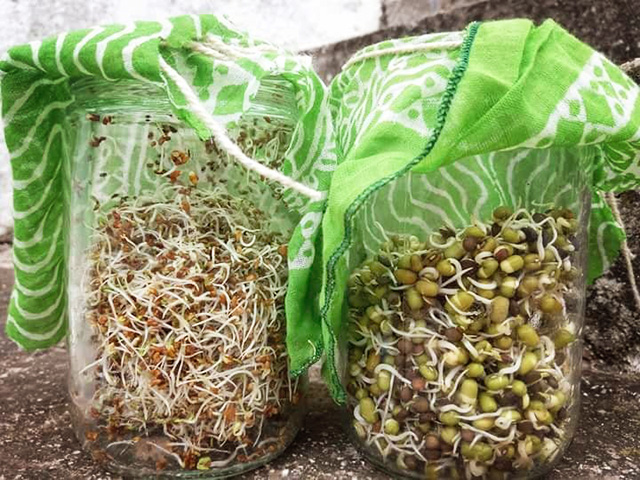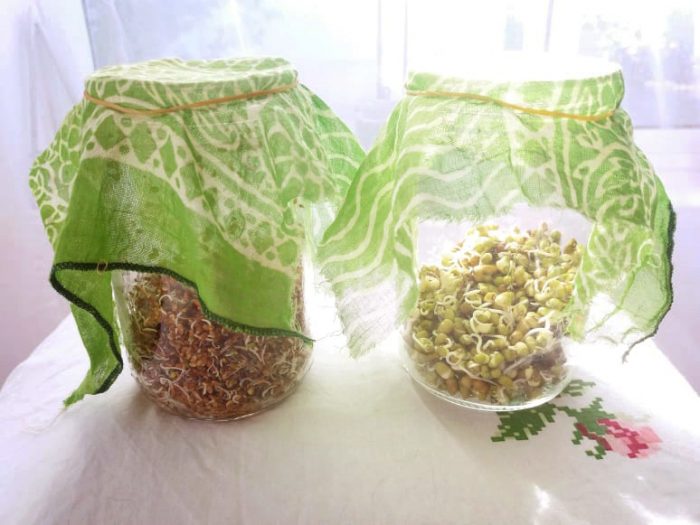
In these uncertain times, nutrition should not be something we also have to worry about.
Before you reach the end of the fresh vegetables you bought for your self-quarantine, add some easy sprouted seeds, nuts, pulses (lentils) to your meals. They’re nutritious, super easy to grow, fun for the kids to experiment, affordable, and delicious. Sprouts are an excellent source of vitamins B and C, iron, fiber, folic acid, and phytonutrients.
I’ve been sprouting just about everything I can find. Almost any seed, nut, legume, and lentil will sprout. Some have better tastes than others. I make it super easy: no special sprouting equipment to buy, just a large clean pickle jar or even reuse a plastic water bottle. Add a thin piece of cloth to the top and secure with a tight string or rubber band. If you have water and what you want to sprout, you’re in business.
Most of the sprouts I do follow the same simple routine:
1. Add some seeds at the bottom of a (clean, sterilized) jar, fill with water, and let set overnight. I do separate the seeds, one jar for alfalfa, one jar for mung…this is because they sometimes have different sprouting times—you can mix together just before eating.
2. In the morning, rinse and strain (I add the cloth and tie at night and keep it on throughout the entire sprouting process, using the thin cloth as a strainer…keeping it simple).
3. Place away from heat or direct sunlight. Every day, I drizzle a little water in the jar, swirl it around, turn the jar upside down to strain, then continue. Most take three days, some take five. My favorite sprouts are mustard seed sprouts and they take about five days. Alfalfa take four or five days and are super nutritious when you see the tiny green leaves appear.
4. Eat your sprouts. They stay fresh for about three to five days after fully sprouting. I keep mine in the fridge.
“Plant love, let it sprout.” ~ H.S. Crow
What you can sprout:
Radish
Mustard
Chickpeas
Alfalfa
Kale
Onions
Clover
Pea
Wheat
Mung
Lentils
Peanut
Soybean
Sunflower
Arugula
Amaranth
Basil
Beet
Wheatgrass
Brown rice
Buckwheat
Celery seeds
Cilantro
Hemp hearts
Sesame seeds
Sprouts that take extra care:
Flax seeds and chia seeds: Both of these (flax and chia) can get a gel coating. They are fine to sprout but it’s better to remove the goo.
Kidney beans: Avoid eating these raw. They should be boiled for 10 minutes before eating.
Quinoa: contain saponins and some may be sensitive (tummy ache).
Tree nuts, like almonds: they don’t sprout as nicely as the legumes (peanuts).
~
“In the garden of dreams, there are many great seeds of possibilities waiting to sprout—looking for your attention—the water and the light.” ~
Sprouts at two days old. Alfalfa (left) and Mung (right):

~
Have a look at the videos below for a few different ways to make these. Sprouts are great additions to salads, sandwiches, soups, and to eat by the handful.
~
Relephant Read: The Coronavirus is already feeding these Bad Things. Let’s use it for Good. ~ Waylon








Read 12 comments and reply